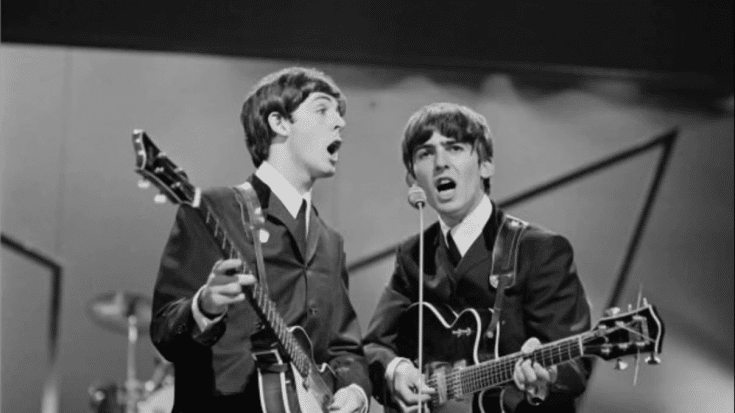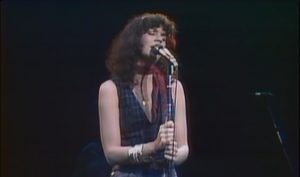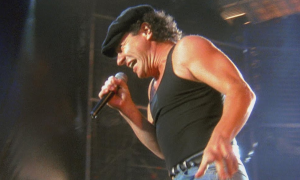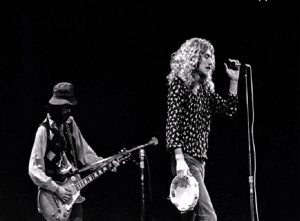Is Classic Rock On A Decline? Did it Change or Disappear?

via J K / YouTube
If you were born in the 90s like I was, your taste in music would be quite a musical adventure. Your childhood anthems would probably be a mixed bag of grunge, bubblegum pop, pop punk, and emo/indie rock.
But one thing is for sure: the ever-present “old songs” from the classic rock radio your parents listen to will always linger inside your head, like some stubborn wisps of web in a corner.
As you grow older and curate a more eclectic and sophisticated playlist, you realize you liked some of those old songs. That’s how most of us realize what classic rock is.
With the advent of music streaming platforms, you’d have easily accessed a vast library of music from various genres. Your taste could have expanded even further, exploring genres like indie pop, folk, rock, and even niche genres like K-pop or reggaeton.
The freedom to discover new music would have made your musical journey constantly evolving.
And classic rock is just casually tucked in its own diverse compilations of playlists, waiting to be accessed by one fervent fan or the occasional adventurous teen who wanted to listen to some “old songs”.
What defines classic rock?
Brian May formed Smile, the band that later became Queen, in 1968. He did not intend it to become one of classic rock’s flagbearers. John Lennon and Paul McCartney certainly did not start out as heroes of the genre when they wrote “Love Me Do” in 1962.
When John Bonham gave birth to heavy rock through the sheer power of his drums, classic rock was not on his mind. Bonzo and his band of rock icons in Led Zeppelin did want to achieve success, but not to be heralded as one of the best classic rock bands of the 20th century.
Classic rock just sort of happened. And it did not just happen in one subgenre of rock; a lot of subgenres of the genre have their own renaissance with one or two acts leading the charge. But with such a massive amount of musicians with their subgenres, it was hard to pinpoint a moving target like classic rock.
View this post on Instagram
What’s definite though are the consumers. The people who listen to certainly dictate what song or band becomes classic rock. The longevity of one track or musician will always depend on its fanbase.
When Walt Hickey of FiveThirtyEight spoke to Eric Wellman, classic rock brand manager for the massive Clear Channel, the latter affirmed that the longevity of “classic rock” is based on its ability to grow based on the musical tastes of its consumers.
As Hickey aptly said, “It’s you, the consumer, who’s helping to define the genre.”
Yes, we have to admit it, classic rock is on a decline.
But, that’s exactly it. The consumers, who dictate classic rock’s longevity, are waning. Rock stations are dwindling, and young listeners have different genres in mind.
Rock is not what it used to be. And classic rock is indeed on a decline.
Although there are still rock bands out there that will turn up on a classic rock playlist decades from now, they are definitely not as many as in the 60s or 70s.
According to Master Class, Classic Rock spans a broad range of rock music produced over three decades, encompassing everything from the psychedelic sounds of the ’60s and the album-oriented rock (AOR) of the ’70s to the college rock of the 1980s, heavy metal, and the grunge of the 1990s.
Additionally, many of these songs are characterized by guitar-driven melodies, and the bands are renowned for their iconic vocalists, such as Freddie Mercury of Queen, Robert Plant of Led Zeppelin, and Axl Rose of Guns N’ Roses.
But, thanks to the evolution of the genre and the consumers, the declining classic rock still has much left in its tank, and it somehow extended towards the late 90s and early 2000s with Green Day songs joining classic rock radio airplay.
So do not be surprised that the rock songs you banged your head, the ones you burned into CDs and passed around your friends, were suddenly played on classic rock radio stations. You’ve just gotten old, and the rock of your generation has become part of the “old songs”.
But not dead yet. It’s still gasping.
But your classic rock heroes have either stopped making music or got dispirited by the lackluster sales of their newer records. Hence they go on lengthy tours and reissue campaigns. The songs from their glory days – the glory days of classic rock – are carried on like a dying torch.
And then someone will declare, “Rock is dead!”
The funny thing was that this declaration of the death of one of music’s most enduring rebels was first tolled in 1957 when King of Rock and Roll Elvis Presley was inducted into the army.
It might have clawed its way back to the surface as The Beatles paraded rock around the world in a roaring fashion.
NEW FILM PROJECT – We are proud to announce an exciting new collaboration between The Beatles and the acclaimed Academy Award winning director Sir Peter Jackson. pic.twitter.com/7e0h95FOWV
— The Beatles (@thebeatles) January 30, 2019
They say it died down sometime around the 70s at the height of disco fever. But in this era, Led Zeppelin, The Who, and The Rolling Stones were the rock deities who distilled their own rock sound, filling their arenas with music and people.
Punk rock snarled its way into the scene, and the heavy metal barged in with new massive rockstars that stomped on the stages and banged their heads to a different incarnation of rock.
You see, rock doesn’t die out, despite what the naysayers declare every now and then. Progressive rock, glam rock, hair metal, grunge rock, thrash metal. The list goes on and on, and the genre spills out its rebellious children onto the masses.
Mid-2010s was quite alarming, though, because many of its rockstars sounded the death knell of rock. Gene Simmons of the KISS was perhaps one of the most vocal misanthropes out there, who still stood by his words that rock is dead.
Other rockstars who sounded the funeral horn were Joe Perry of Aerosmith, Simmons’ bandmate Peter Criss, the late Lemmy Kilmister of Motörhead, Scott Ian of Anthrax, John Mellencamp, and even Flea of Red Hot Chili Peppers.
Getting ready backstage. Pittsburgh, here we come! pic.twitter.com/KJgBCp60nX
— Gene Simmons (@genesimmons) March 30, 2019
The airplay for classic rock obviously and palpably dwindled in the last decades due to the resurgence of pop and the introduction of electronic dance music and R&B. Radio stations understandably turned away from rock since younger audiences wanted to listen to other genres.
And then streaming came onto the scene, further dwindling the monetary hopes of our heroes who mostly depended on the sales of their physical records. This was the reason why Simmons declared rock’s death, “I stand by my words, rock is dead and the fans killed it.”
But rock’s death throes, if ever they are indeed the genre’s last gasps, are still thunderous roars that attract new generations of listeners.
Classic rock revival and new wave of young rockstars.
There are still movements out there that advocate the revival of classic rock.
This passion for rock music, backed by a thriving grassroots community of rock fans with a hunger for new music, is evident in groups like The New Wave Of Classic Rock on Facebook. Founded in 2017, this platform allows members to share videos and recommendations of new bands they’ve discovered.
View this post on Instagram
Jeremy Wills, its co-founder and administrator, shared, “We felt there were so many quality new bands out there. It genuinely feels like something exciting is happening.”
The group, boasting 10,000 members, serves not only as a platform to exchange tips on emerging bands but also as a support system for the grassroots rock scene.
When bands like Tequila Mockingbyrd faced equipment theft during a European tour, the group rallied, printing and selling T-shirts to help financially. They’ve also stepped in to save gigs at risk of cancellation.
And there’s one band that has grabbed attention in 2017: Greta Van Fleet. This Michigan-based rock band have always drew comparisons to Led Zeppelin, and their chart-topping classic-rock-sounding “Highway Tune” did signal a revival. At least, in the mainstream that is.
For the picky denizens of NWOCR, there are tons out there that are better than Greta Van Fleet.
Hence, the rise of then young rockers has sparked mixed reactions, but Wills sees it as a potential catalyst for a new wave of younger bands. “If it means even one teenager starts playing rock music, that’s a good thing,” he added.
And it isn’t just the Greta Van Fleet who’s leading the charge. A number of bands had also gained momentum and following in the recent years: Dirty Honey, Rival Sons, Dorothy, Crown Lands, Larkin Poe, Joyous Wolf, Glove, The Strust, to name a few.
Chris Ingham, director of music event company Spirit of Rock and classic rock fan, had co-initiated a classic rock festival called Ramblin’ Man Fair that features rock acts the likes of Scorpions, ZZ Top, Black Stone Cherry, The Cult, Whitesnake, Gregg Allman, and many more.
View this post on Instagram
It started in 2015 and stopped since the pandemic. It plans to come back this year, and will feature new names in rock through their Rising Stage.
“There is a wealth of talent out there. [In 2018], we received over five hundred band applications for the Rising Stage, and I would have offered recording contracts to the top thirty because they were that good,” Ingham shared.
NWOCR, Greta Van Fleet, Ramblin’ Man Fair’s Rising Stage. And all other movements out there drumming it up for classic rock. They represent something bigger: the undeniable potential of rock and roll as a cultural phenomenon.
Classic rock lives on.
Whether it’s in a decline or not, classic rock lives on. There will always young rocker out there who wanted to try some for of rock. There will always be a fan who will stumble upon the greatness that was classic rock.
Classic rock’s influence was so massive that even the tiniest of its heartbeats are capable of powering up a new generation of rockstars. The decline is indeed felt and the industry is reeling, but the hope is till there.
The spirit of rock and roll isn’t one to just die down silently. Classic rock may go silent on the radio but it will live on.
View this post on Instagram
In the young man skateboarding with a Nirvana t-shirt on; or in the blue-collar worker relaxing at home playing AC/DC; or in the teenager stumbling upon a ‘Classic Rock Greatest Hits’ on Spotify.
Much like music itself, classic rock evolves and adapts. It was shaped by the generations that played it, by the zeitgeist of an era.
As rock singer Michael Des Barres beautifully said: “The vision of a guitar around the scrawny neck of a 17 year old kid epitomises the notion that rock & roll is not deceased. Quite the opposite. The sensuality & carefree chords will ring out again. Of that there is no doubt. Simply put, a guitar is sexier than a computer.”














